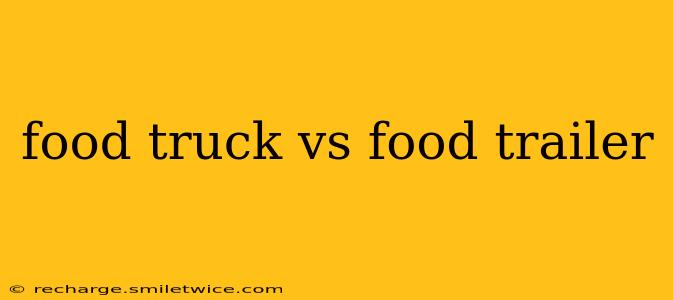The culinary world is booming, and mobile food businesses are a significant part of that growth. But when starting your own venture, a crucial first decision is whether to invest in a food truck or a food trailer. Both offer unique advantages and disadvantages, and choosing the right one is critical for your success. This comprehensive guide will delve into the key differences, helping you make an informed decision.
What are the Key Differences Between a Food Truck and a Food Trailer?
The most obvious difference is mobility and maneuverability. Food trucks are typically larger vehicles, often repurposed box trucks or purpose-built chassis, offering more internal space and sometimes enhanced features like built-in generators. Food trailers, on the other hand, are towed behind a separate vehicle, offering greater flexibility in terms of location (they can be easily moved to different spots even without access for large trucks). However, this requires an additional vehicle and a driver's license that permits towing.
What is the Cost Difference Between a Food Truck and a Food Trailer?
The initial investment is a major consideration. Food trucks generally cost significantly more than food trailers. This is due to the higher cost of the vehicle itself, plus the potential for more extensive build-out requirements due to the existing structure. Food trailers, being smaller and often simpler in design, usually have lower upfront costs, though this is highly dependent on the level of customization. However, remember to factor in the cost of the tow vehicle for a trailer.
Which is Easier to Operate: Food Truck or Food Trailer?
Ease of operation depends on individual circumstances and preferences. Food trucks offer greater independence; they are self-contained units, often equipped with everything you need for operation. Food trailers, needing a separate tow vehicle, add an extra layer of complexity, requiring coordination of two vehicles and potentially additional staffing. However, some find trailers easier to manage in terms of parking and maneuvering in tighter spaces, once they are on site.
What are the Legal and Licensing Requirements for Food Trucks and Food Trailers?
Legal requirements vary significantly by location. Both food trucks and trailers are subject to health and safety regulations, business permits, and often specific zoning laws. It’s crucial to research your local regulations thoroughly before purchasing either option. These regulations often cover aspects such as food handling, sanitation, and waste disposal. Don't hesitate to consult local authorities for precise requirements in your area. There may be additional requirements depending on whether your vehicle is self-propelled (truck) or requires towing (trailer).
What are the Advantages and Disadvantages of a Food Truck?
Advantages of a Food Truck:
- Greater visibility and brand recognition due to its mobility and size.
- Self-contained unit—everything needed for operation is built-in.
- Potential for increased sales due to larger kitchen space and capacity.
Disadvantages of a Food Truck:
- Higher initial investment and ongoing maintenance costs.
- Limited flexibility in terms of location due to size and maneuverability.
- Parking and licensing restrictions may be more stringent.
What are the Advantages and Disadvantages of a Food Trailer?
Advantages of a Food Trailer:
- Lower initial investment.
- Greater flexibility in location; easily moved to different spots.
- Potentially easier to maneuver in tighter spaces once positioned.
Disadvantages of a Food Trailer:
- Requires a separate tow vehicle and driver.
- Less visibility than a food truck.
- Potentially smaller kitchen space, limiting menu options and capacity.
Which is Better for Different Business Types?
The best choice depends heavily on your specific business plan and goals. A food truck might be a better fit for high-volume operations aiming for consistent visibility in busy areas, while a food trailer could be ideal for businesses focused on catering, events, or locations with limited access. Consider your target market, menu, budget, and operational strategy to determine which option aligns best with your long-term vision.
By carefully considering these factors, you can make an informed decision that sets your mobile food business up for success. Remember that thorough research into local regulations and a well-developed business plan are crucial for any mobile food venture.
